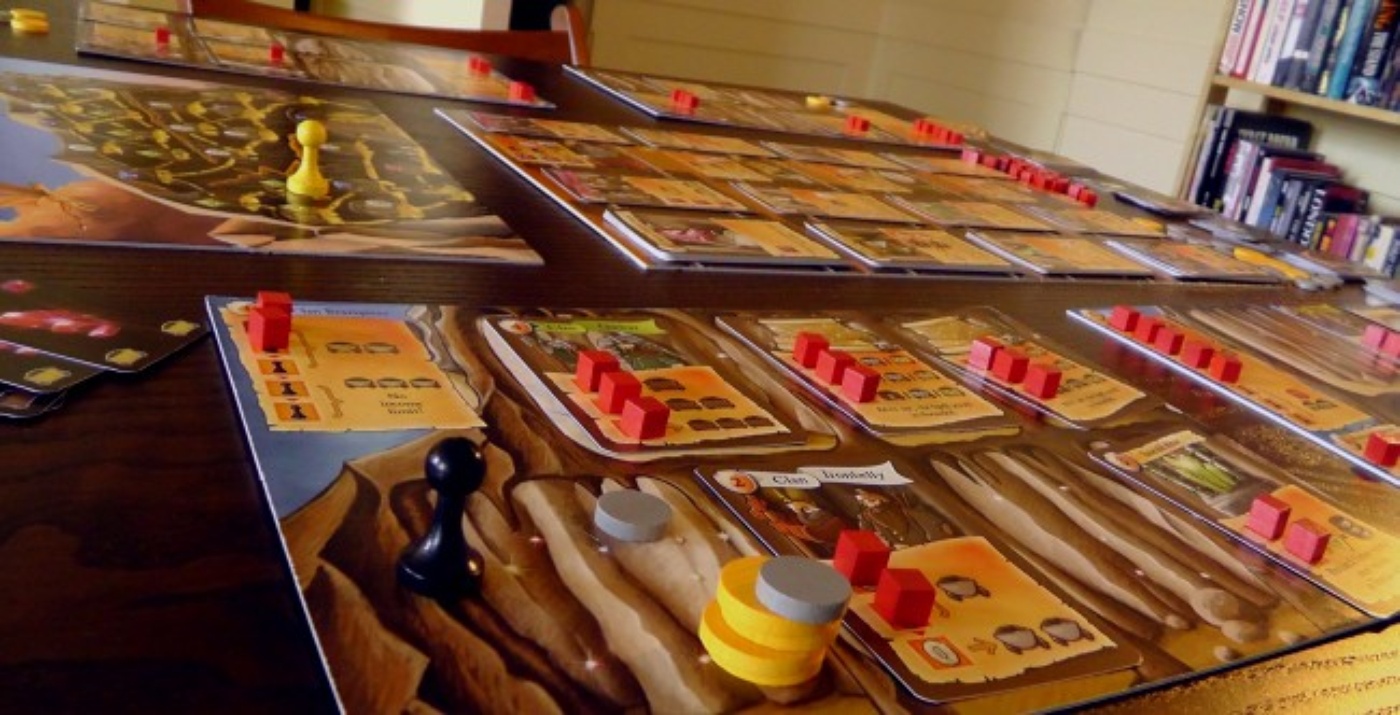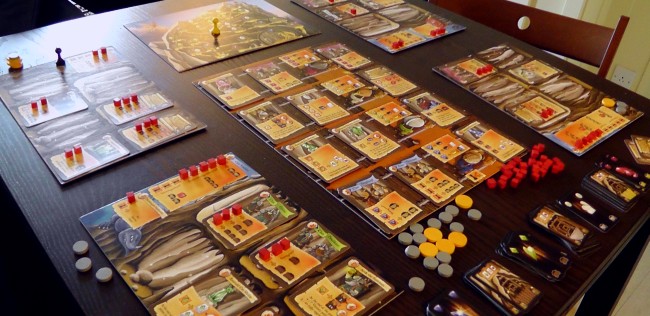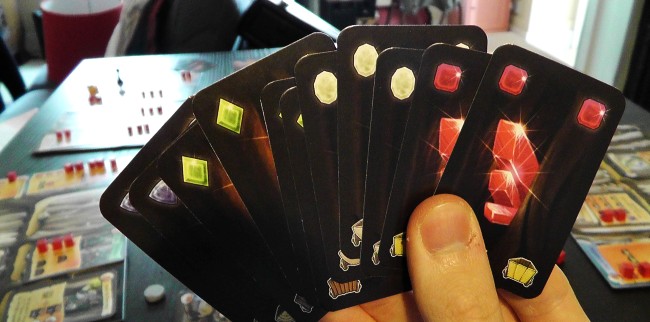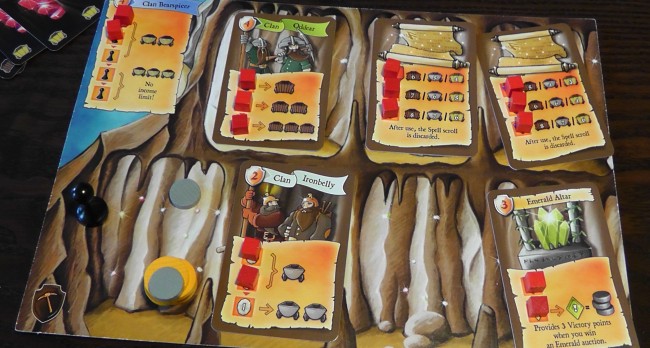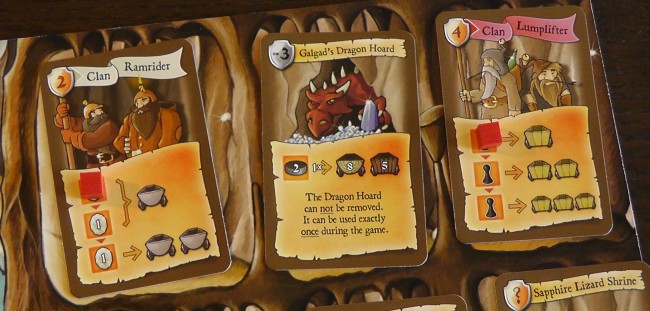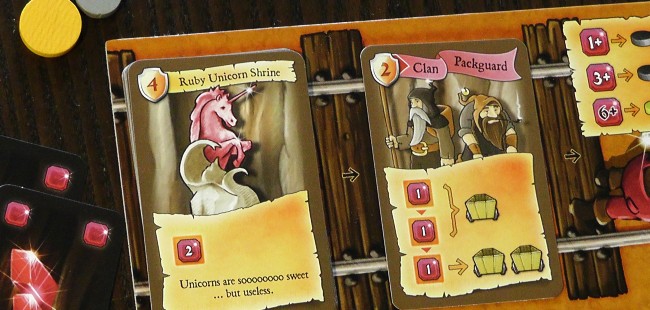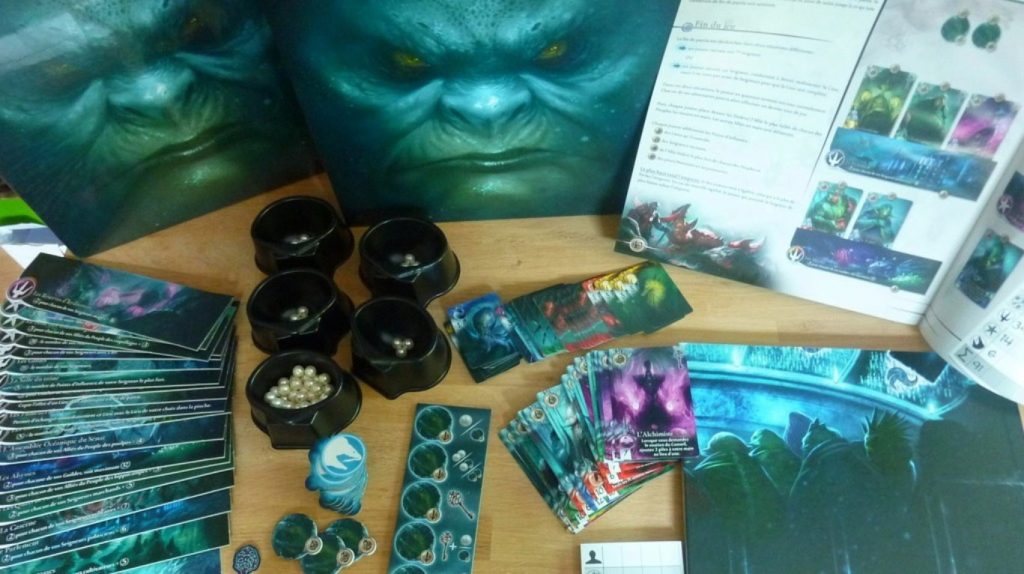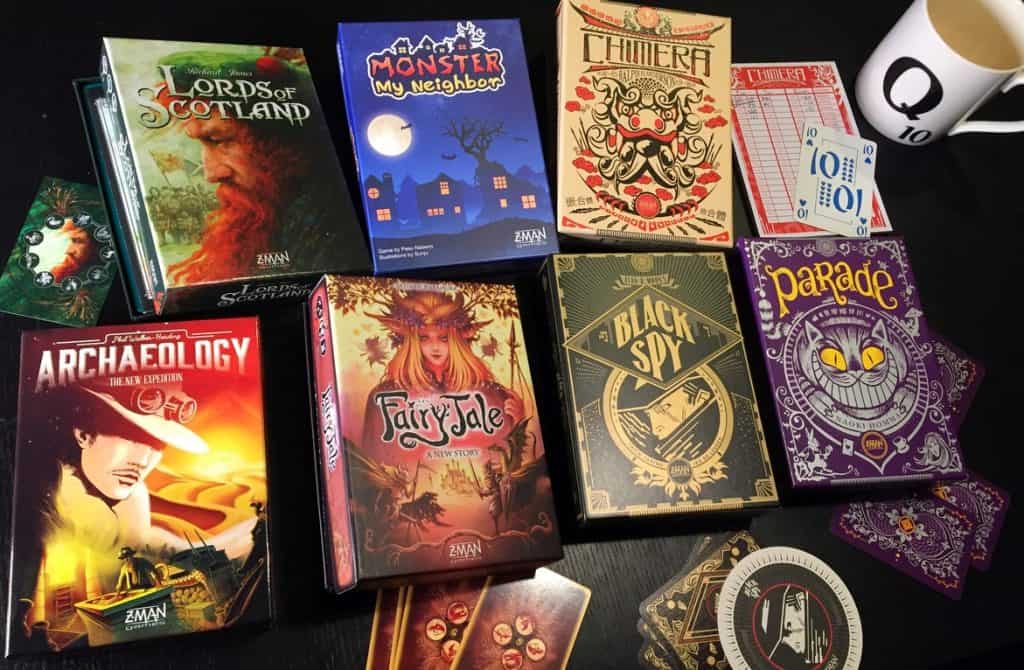Quinns: CAPITALISM! It’s what’s for dinner.
Paul: It’s what’s for dessert, surely, especially if it’s about excess. The Mines of Zavandor is just the kind of cash-clutching economy management we can put all of our pasty weight behind. That’s because it treats running a business with the same giddy lack of dignity as J.K. Rowling gave to the arcane.
The Dwarf king is dead. Two to four players control Dwarf clans attending his interminable funeral procession, winding through an entire mountain. Yet what you’re doing isn’t mourning, but receiving gems from back home and using them to buy, buy, BUY at the many auctions of useful or decorative tat you’re passing by. That’s because at the end of the procession (game) the richest clan is the new king (winner)!
Quinns: So far, so sweet. And this is a lovely game-
Paul: Good! Great. Then we have nothing else to talk or argue about. I’m glad.
Quinns: Now hang on-
Paul: Shut Up & Sit Down recommends, everybody! (Men and women in swimsuits come out and dance for fifteen minutes.)
Quinns: PAUL!
As I was saying, The Mines of Zavandor is lovely, My favourite thing about it is that it leans heavily on auctions, one of those deeply human game mechanics, like bluffing or negotiation, that have remained as strong in board games as they’ve been absent from videogames. As a violently obsessive videogamer for 20 years, these always tickle my fancy.
But…
No, it’s not time for that “but” yet.
Paul: Here’s how it works. Every stop on your grim little tour will see a number of items up for auction equal to the number of players, and each auction will be designated as either rubies, sapphires, diamonds or emeralds, meaning you can only bid with those stones.
Players earn gem cards each turn, sequestering however many they want to bid in one hand, before revealing them simultaneously. Whoever bid the most diamonds wins the diamond auction, and so on, meaning you only get one shot at any given item, and the only thing more irritating than letting some vital trophy slip through your fingers is burning a fat stack of gems on something nobody else even bid for.
Quinns: Yes. So for the hour the game lasts you’re trading tiny stacks of sapphires and rubies for spells, statues, access to more mines, basically swapping shiny treasures for shinier treasures. Which you proceed to make even shinier!
After each auction you can pay even more gems to upgrade all the cards that you’ve snatched out from beneath the vacant, bovine eyes of your opponents. Upgraded magic scrolls erupt into more gems. Upgraded clans drag more gems to you every turn. Upgraded packdragons do away with your income limit, and then you’ve got shrines, altars, magicians, foremen and more.
Most importantly, once something’s fully upgraded, you get victory points for it at the end of the game.
Sounds lovely, doesn’t it? And it is kind of lovely.
…but!
Paul: Oh, lord.
Quinns: …here’s my problem. If you compare satisfying mechanics in a board game (clever ploys, satisfying constructions, rapid attack or blocks) to the noise of two billiard balls clacking together, Zavandor only ever makes the noise of a halcyon cue ball rolling across the felt.
Paul: Wh- I am confused, confused by this halcyon cueball concept. Are you missing something here?
Zavandor is such an easy game to dive into. Everyone immediately understands what’s at stake. You’re playing several secret auctions very turn, with no idea how much you should bet but a very real knowledge of what’s at stake.
It’s wonderfully easygoing both mechanically and thematically. You want the pretty thing that lets you get more pretties, pretties piled high to the sky? Bet your beard off. But pick your battles, uh, auctions, and do your best not to overreach-
Quinns: I get The Mines of Zavandor. I’m pretty good at it! By the end of a game my clan’s gallery board looks like a car dealership. But…
OK, readers. There’s a term in the board game community called “crunch”. “This is like that game, but with more crunch.” When I first heard this in my local game shop I nodded along to the employee there but I had no idea what he was talking about. Zavandor has taught me about crunch. Specifically, because it has none.
Its blind auctions are the most unfeeling form of bartering you can get. You slip your bids forward and win or lose, with no blood or bluster, then immediately move on to the business of upgrading cards on your board, which nobody else even cares about! Once cards are on your board, they might as well be in your pants, because nobody else will touch them ever again. They might look at them, I guess. Sly glances, eyeing up the size of your package. Are you winning? Are they winning?
Paul: That’s a point. Your interaction with other players, apart from a bit of potential gem trading, is limited to something like tossing money in the dark, then turning on the lights to see how much everyone threw together. I totally get how you’re not mad about this. But aren’t you excited by choosing to spend cards or hold them, or forcing the funeral procession to take a particular route through the-
Quinns: No Paul I am not excited about choosing the route for the funeral procession WHAT IS WRONG WITH YOU.
My ideal economy management game would feature cutthroat brokering, sideways sabotage, sweat beading on your brow as you invest outrageously in some… uh, investment, then gawp in disbelief as your holdings collapse like a house made of dollar bills. Zavandor feels like you’re all just… reaching into a bowl and grabbing at a fish. There’s a teasing knack to it, but it’s as uninspiring as it is wet.
Paul: …
Quinns: …
Paul: Well, I quite like it. You like wee cute, pretty things, don’t you? Look at it! It’s all cute and wee. It could slot into your collection and you’d hardly know it was there! And it’s so easy to get into, unlike so many of its peers. And it’s quick!
Quinns: Yes. Nice things all. But – and I’m holding this question to your forehead like a loaded gun – would you recommend it to someone?
Paul: OH GOD DON’T HURT ME NO, NO I WOULDN’T.
It’s fine, it’s a fine game, it’s pleasant and nice and I hate the word nice DON’T HURT ME I admit it’s just nice but probably not worth the money ohjesus’;lkas’;lafsd
Quinns: It’s OK! I’m putting the abstract gun away. Shh, shh. It’s OK. Come into my arms. Oh, you’re like a little scared baby dove. Coo, coo. Rest. You’re safe now.
Paul: *flapflapflap*
*poop*

